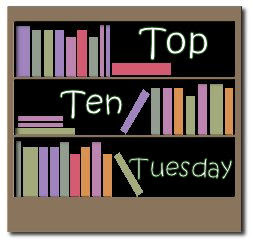I haven't disappeared. Today's top ten courtesy of the
Broke and the Bookish is favorite authors. I'll do no particular order and just come up with names quickly, so as not agonize over picks because then I will just lament going over the list at a later date wondering why I left an author off. Who am I kidding? I'll still do that but, yeah, ok here goes:
1. James Lee Burke - He is sort of a hero for me. Burke published a handful of books in the 60's that were fairly well received critically. He wrote stories of down on their luck folks looking for redemption. They were essentially the same types of stories that he writes now, but they were classified as literary fiction. Despite this modest early success, however, Burke went unpublished for nearly a decade. His novel, "The Lost Get Back Boogie" spent eight years circling the publishing houses and received over 100 rejections. Finally, Louisiana State University Press, published it, and it was nominated for a Pulitzer (I'm not really sure what that means). Burke on the advise of Charles Willeford, then took on the crime/mystery genre. He created Dave Robicheaux and basically continued to tell the same sorts of stories he always had except with a recurring character -- a police detective. He is now a bestselling author, and a two time Edgar Award winner and a Mystery Writers of America grandmaster. He also writes some of the most violently, beautiful prose this side of Shakespeare. As someone that fancies himself a part time writer, and holds the dream, occasionally, of someday being read outside of immediate family, James Lee Burke's story of persistence is particularly inspiring.
2. Ernest Hemingway - In music, sometimes the beauty is not in the notes played but in the space between the notes. In architecture, it is often the space between the elements rather than the craft lavished upon the elements. In literature, sometimes the beauty is Hemingway and not everyone else that came before him. He is the master of the unsaid. Plus he writes about slaying big fish, bullfighting, climbing mountains, war...c'mon, what's a guy not to like.
3. Walter Mosley - He writes about a world I have never known (post WWII black L.A.), and makes me feel as if it is my own.
4. Vladimir Nabokov - I've read ONE book by him, and it's enough to make room for him on this list. Anyone that can make the reader sympathize with a pedophile is masterful.
5. Charles Dickens - yes, it all seems dated and long winded. But the stories, my god, the stories. Great Expectations is probably my favorite "assigned" book I've ever read. Freshman year, high school.
6. John D. MacDonald - he is a man of his times, and to enjoy him perhaps you need to give him a mulligan on that, but he was also ahead of his times in other regards - his thoughts on the environment seem particularly relevant today. I discovered him on my dad's bookshelves one weekend when I was visiting him, and read that book ( "Nightmare in Pink" ) in one sitting, and was forever hooked on his Travis McGee books. Part of the allure was McGee's adventures were set in Florida and having lived there all my life the locales were familiar to me. Just writing about him has me wanting pull one of the ratty paperbacks out of my collection.
7. Cormac McCarthy - my first exposure was "The Road". It was, maybe, the most powerful book I had ever read. McCarthy's ability to portray one driving image throughout the length of the novel was reminiscent to me of Hemingway's "The Old Man and the Sea". I have since read most of his other books. Most of them more than once. McCarthy is one of the few authors that hold up to re-reads for me. I alway find greater appreciation the second time through. This was especially the case with "Blood Meridian", McCarthy's opus. A very disturbing look at America's lust for violence and expansion. I often catch myself telling people McCarthy is my favorite author, though I'm not sure if that is true or not.
8. William Shakespeare - C'mon, really, has there ever been a greater storyteller? I love him on the page and on the stage. I love him writing sonnets. Hell, I even love the stuff he is said not to have written...
9. Raymond Chandler - As a mystery writer, his plots aren't the greatest. He leaves his share of loose ends, and the whole thing kind of meanders all over the place...from one kick ass scene to another...from one colorful character, like no one you've ever seen, to another. And that, not the metaphors, is what Chandler brought to the detective genre. His voice is more compelling than Dashiell Hammett's, which for me, makes him the King of the hardboiled. His 'The Long Goodbye' should be read by everyone in my opinion. It is his most literary achievement.
10. J.R.R. Tolkien - "The Hobbit" was assigned to me in 7th grade, and it was the first fictional book that had really caught my attention since the Roald Dahl books I had read in elementary school. I had spent the prior five years or so reading books like, "Greatest Halfbacks of the NFL" and an untold number of Mickey Mantle biographies. About the time I read "The Hobbit", I was also playing a lot of Dungeons and Dragons, so the adventures of Bilbo Baggins held an additional appeal in that regard. Of course, I went on to read LOTR, and even dabbled in some of the mythology reading parts of The Silmarillion and other works. I think Tolkien is most impressive in this regard - the detail involved in his mythological history. As a storyteller, though, I don't think he ever surpassed "The Hobbit."



















